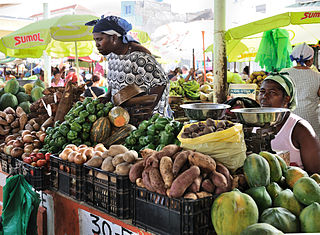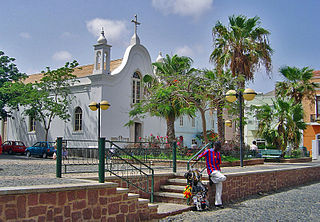| |||||
| Decades: | |||||
|---|---|---|---|---|---|
| See also: | Other events of 2003 Timeline of Cabo Verdean history | ||||
The following lists events that happened during 2003 in Cape Verde .
| |||||
| Decades: | |||||
|---|---|---|---|---|---|
| See also: | Other events of 2003 Timeline of Cabo Verdean history | ||||
The following lists events that happened during 2003 in Cape Verde .

The recorded history of Cape Verde begins with the Portuguese invasion and colonization of the island in 1458. Possible early references to Cape Verde date back at least 2,000 years.

Mindelo is a port city in the northern part of the island of São Vicente in Cape Verde. Mindelo is also the seat of the parish of Nossa Senhora da Luz, and the municipality of São Vicente. The city is home to 93% of the entire island's population. Mindelo is known for its colourful and animated carnival celebrations, with roots in Portuguese traditions later influenced by the Brazilian culture.

São Vicente is one of the Barlavento Islands, the northern group within the Cape Verde archipelago in the Atlantic Ocean, off the West African coast. It is located between the islands of Santo Antão and Santa Luzia, with the Canal de São Vicente separating it from Santo Antão.

The Catholic Church in the Cape Verde is part of the worldwide Catholic Church, under the spiritual leadership of the Pope in Rome. The country is divided into two dioceses: Mindelo and Santiago de Cabo Verde.

Cesária ÉvoraGCIH was a Cape Verdean singer known for singing morna, a genre of music from Cape Verde, in her native Cape Verdean Creole. Her songs were often devoted to themes of love, homesickness, nostalgia, and the history of the Cape Verdean people. She was known for performing barefoot and for her habit of smoking and drinking on stage during intermissions. Évora's music has received many accolades, including a Grammy Award in 2004, and it has influenced many Cape Verde diaspora musicians as well as American pop singer Madonna. Évora is also known as Cizé, the Barefoot Diva, and the Queen of Morna.
Adriano Gonçalves, known by his stage name Bana and called the "King of Morna", was a Cape Verdean singer and performer of the morna style, the plaintive, melodic lament which is a staple musical style of the country.

The University of Cape Verde is the only public university of Cape Verde. The main campus is in Palmarejo, Praia, but there are also institutes in Mindelo, Assomada and São Jorge dos Órgãos. It has over 5000 students. A new campus for Uni-CV is under construction in Palmarejo, financed by the Chinese government. It should be completed by July 2020. It will have capacity for 4,890 students and 476 professors, with a library, dorms, cafeterias and sports facilities. It will have 61 class rooms, five auditoriums with a capacity of 150 seats, eight computer rooms, eight reading rooms and 34 laboratories.
The Diocese of Mindelo is a Latin Church ecclesiastical territory or diocese of the Catholic Church in Cabo Verde. Its cathedral is Catedral Nossa Senhora da Luz in the episcopal see of Mindelo. The diocese is immediately exempt to the Holy See and not part of any ecclesiastical province.

Arlindo Gomes Furtado CSSp is a Cape Verdean prelate of the Catholic Church who has been bishop of the Diocese of Santiago de Cabo Verde since 2009. He was the first bishop of the Diocese of Mindelo from 2004 to 2009. He studied for several years in Coimbra, Portugal, while preparing for his ordination, and several more as a professor there after becoming a priest.

Primary school education in Cape Verde is mandatory between the ages of 6–14 and free for children ages 6–12. In 1997, the gross primary enrollment rate was 148.8%. Primary school attendance rates were unavailable for Cape Verde as of 2001. While enrollment rates indicate a level of commitment to education, they do not always reflect children's participation in school. Textbooks have been made available to 90% of school children, and 90% of teachers have attended in-service teacher training. Its literacy rate as of 2010 ranges from 75 to 80%, the highest in West Africa south of the Sahara.

The economy of Cape Verde is a service-oriented economy that is focused on commerce, trade, transport and public services. Cape Verde is a small archipelagic nation that lacks resources and has experienced severe droughts. Agriculture is made difficult by lack of rain and is restricted to only four islands for most of the year. Cape Verde's economy has been steadily growing since the late 1990s, and it is now officially considered a country of average development, being only the second African country to have achieved such transition, after Botswana in 1994. Cape Verde has significant cooperation with Portugal at every level of the economy, which has led it to link its currency first to the Portuguese escudo and, in 1999, to the euro.

Cape Verde or Cabo Verde, officially the Republic of Cabo Verde, is an archipelago and island country of West Africa in the central Atlantic Ocean, consisting of ten volcanic islands with a combined land area of about 4,033 square kilometres (1,557 sq mi). These islands lie between 600 and 850 kilometres west of Cap-Vert, the westernmost point of continental Africa. The Cape Verde islands form part of the Macaronesia ecoregion, along with the Azores, the Canary Islands, Madeira and the Savage Isles.

Cape Verde was a colony of the Portuguese Empire from the initial settlement of the Cape Verde Islands in 1462 until the independence of Cape Verde in 1975.

The history of the cinema of Cape Verde dates back to the arrival of filmmakers in the early twentieth century. The first picture house was established in Mindelo around 1922, called Eden Park.

The Pro-Cathedral of Our Lady of the Light is a Roman Catholic church in the city of Mindelo, on the island of São Vicente, Cape Verde. It is located on Rua da Luz, in the city centre. Built in 1862, it is one of the oldest buildings of Mindelo. However, the church has been enlarged recently, leaving only the façade in its original state. It is the seat of the Roman Catholic Diocese of Mindelo, created in 2003.

The City center of Mindelo or Morada is the historic center of the Mindelo in the island of São Vicente, Cape Verde. Its population was 1,553 at the 2010 census. It is the place where the island's first settlement was founded in 1793. Many public buildings are situated in the city centre. It lies along the Porto Grande Bay. Adjacent neighbourhoods include Fortinho to the northwest, Alto Miramar to the northeast, Fonte Cônego to the east and Ribeira Bote to the southeast.
The following lists events that happened during 2005 in Cape Verde.
1910s – 1920s – 1930s – 1940s – 1950s – 1960s – 1970s – 1980s – 1990s – 2000s
Paulino do Livramento Évora was a Cape Verdean clergyman and the first Cape Verdean-born bishop of Cape Verde.

Ildo Augusto dos Santos Lopes Fortes is a Cape Verdean clergyman and the second and current bishop of Mindelo.